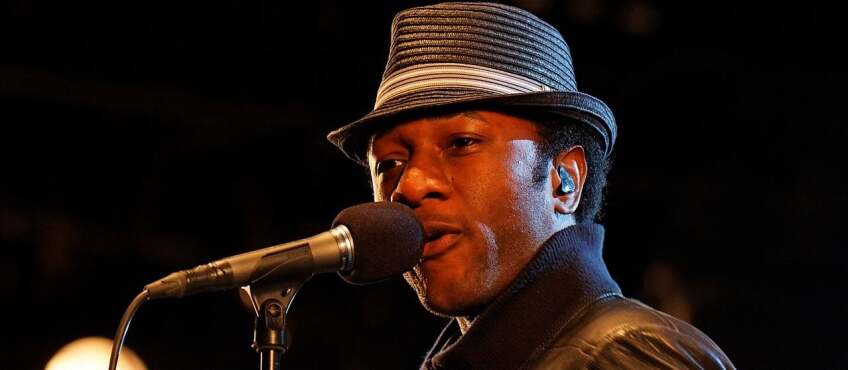Aloe Blacc and the Return of Socially Conscious Commercial Music

For "Studio A," singer-songwriter Aloe Blacc performed new music and a cover of Joni Mitchell's 1970 classic "Big Yellow Taxi." It was a fitting union for a contemporary pop artist who is also an activist for various different causes to take on a '70s pop tune that deals with disregard for the environment.
From human rights to environmental justice, the call for all citizens to speak up has grown stronger and that could impact music too. Are we heading towards an era like the 1960s and early 1970s, where musicians large and small are using their voices — their instruments — to spread the call for political and social change?
Blacc thinks that might be the case. "I see what's happening across the entire landscape from commercial to independent music," says the L.A.-based singer-songwriter off-camera, "and I have a feeling that commercial music will become like what happened in the '60s and '70s where there is more political and social-minded music."
Blacc is on the commercial side of music spectrum. You might know him best from his collaboration with DJ/producer Avicii, "Wake Me Up," which was a monumental hit back in 2013. "My music is for sure commercial," he says. "I'm on a major label and my intention is to sell records, but I write songs from the state of mind of writing a great song that will increase my chances of making it into the Songwriters Hall of Fame, because you don't get there by selling records, you get there by making great songs."

Blacc refers to himself as an "artivist," a portmanteau of the words artist and activist. From early in his career, he has been writing songs that point to struggles in the world (hear: "I Need a Dollar" from his 2010 album "Good Things") and has been involved with various causes. He has also been outspoken about issues like songwriter's rights. "It's a discussion that I think is important," says Blacc. "It's difficult to change laws. Songwriter's laws are the last on the list. They're very old and they aren't going to change anytime soon. There's not a big enough lobby. We don't have a lobby that's going to pay lawmakers to change it, so it's tough." That one job-related issue can impact Blacc's artivist activities. As he says inside Studio A: The more control Blacc has over his work, the more time he can spend on activism. "I would say it's helpful from that perspective," he adds.
During his time at Studio A, Blacc performed some new tunes. Amongst them was "Dandelion Down," a story about a father and son that he says he plays for his own child. Blacc explained to KCET that he tries to use universal themes when he writes songs so that they can translate across borders.
"A lot of the songs that I performed today are new songs and some of them relate to my family and experiences I've had with kids, my wife," Blacc tells KCET in his on-camera interview. "Others are songs I've written inspired by events that happen in society. Just wanted to tell the story of the common individual."
In "Best Is Yet to Come," which Blacc performed for "Studio A," the artist says that he offers advice to himself, as well as to listeners. "The idea is that if you just focus on what makes you feel good and find your purpose in life, then you don't have to worry about perfection in the abstract in the sense that either your parents or your boss or society is telling you how to be perfect or what to do to be perfect," he says.
Blacc, who recently released the single "King Is Born," started out as an MC in the hip-hop world, but ultimately found his audience as a pop singer with an old soul vibe. He tells KCET that his goal is to give listeners "peace of mind." He's also out to spread love. "I really feel strongly that love makes the world a better place. It's such a simple concept," he says. "You hear it over and over again. It sounds cliché, but in practice, it makes a world of difference."

Some of Blacc's work wasn't made with a specifically political message in mind, but have later come to take on that role. That was the case for "Wake Me Up" when it was used in a video collaboration that explored immigration to the U.S. That's an issue of importance to Blacc, whose parents immigrated to the United States from Panama. "I feel it's important to humanize the topic," he tells KCET. "In some circles, people may speak about immigrants as objects, but we have to recognize that we're talking about human beings with hopes and dreams, families with their own trials and tribulations and they're just looking for a better life. With that said, I try to use my music and my voice to speak truth to power and tell the stories that I think will humanize the subject."
Meanwhile, the video for "Love Is the Answer," from "Lift Your Spirit," came about after discussions with the Community Coalition about the school-to-prison pipeline. "I thought it was important to make a music video that told the story from a student's perspective of how the school-to-prison pipeline is a real phenomenon and how it's important to pay attention to it and thinking about how we're going to change it," he says.
Blacc says that his pop evolution has helped him bring messages to greater audiences. "It's important to discuss issues about ecology and how there are corporations who should be paying their fair share of taxes and reducing their carbon footprint at the same time," he says. "I think it's important to continue to discuss how we can make an impact on the diseases that are plaguing the world, like malaria, still killing a child every two minutes. There are solutions."
Blacc adds, "I don't want to dilute my message by having too many causes, but there are so many causes that are important. If I could have a song for each one of them, maybe that's the best way."
Top Image: Aloe Blacc in concert | Kmeron/Flickr/Creative Commons


